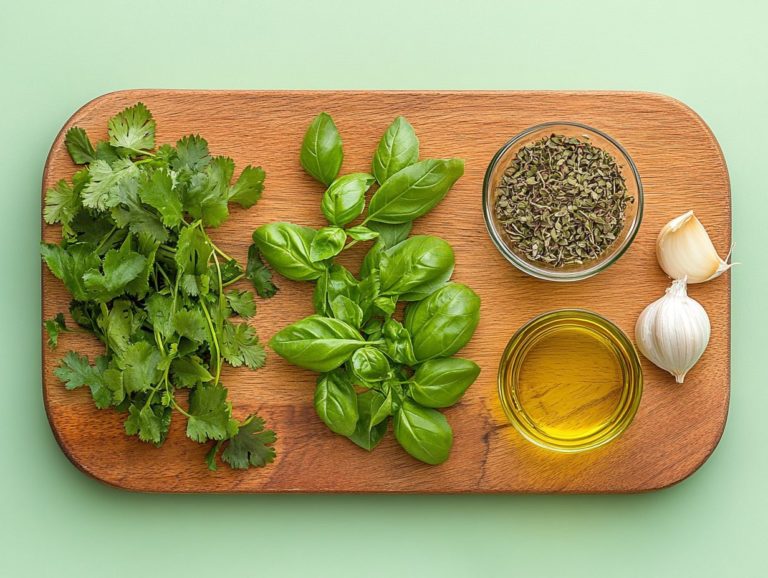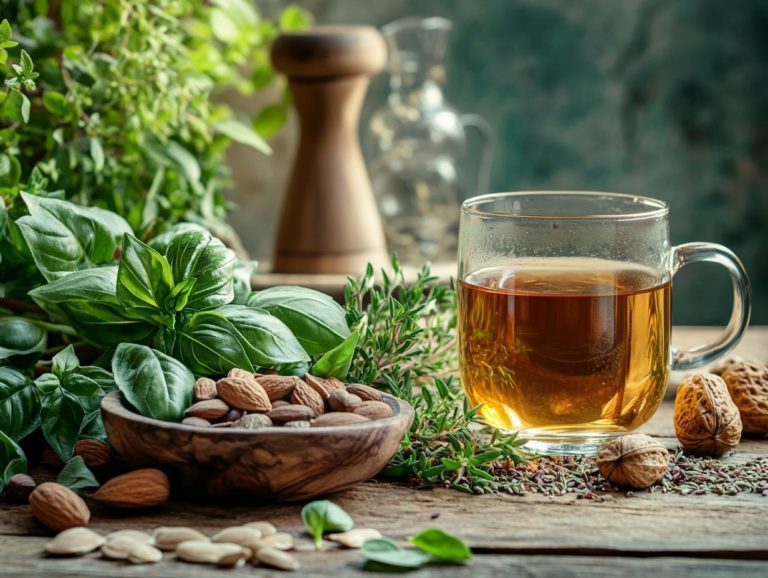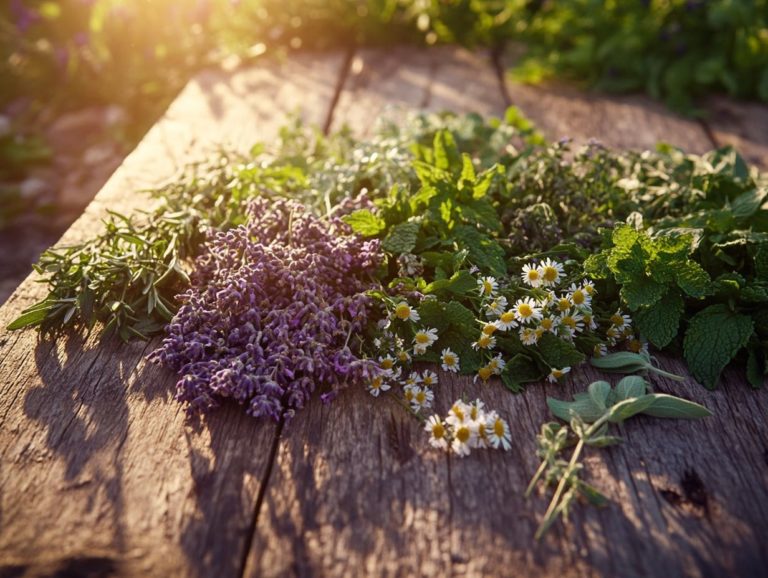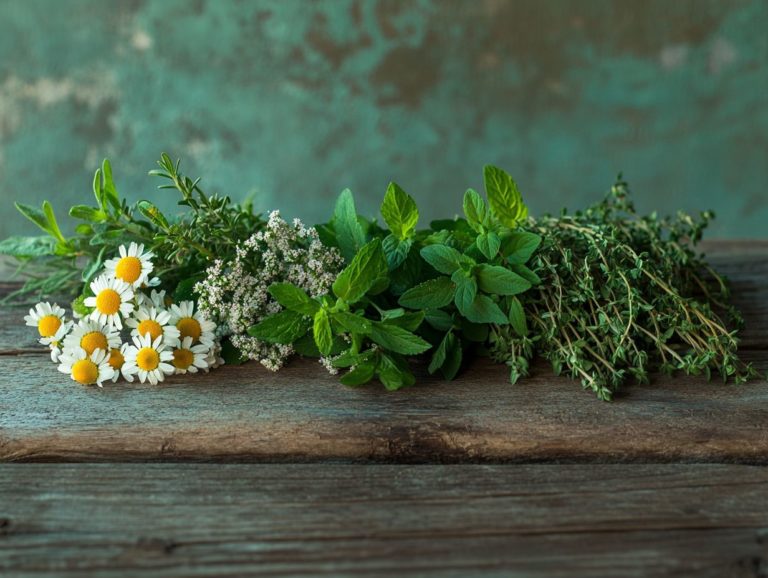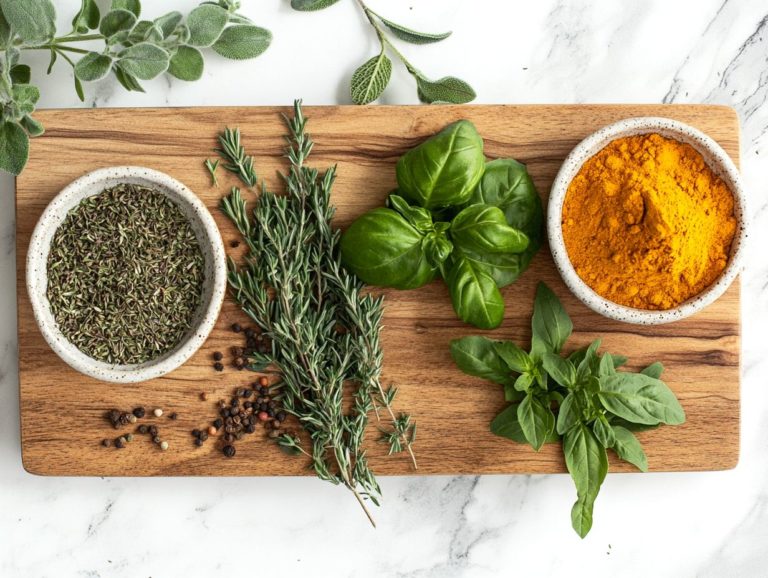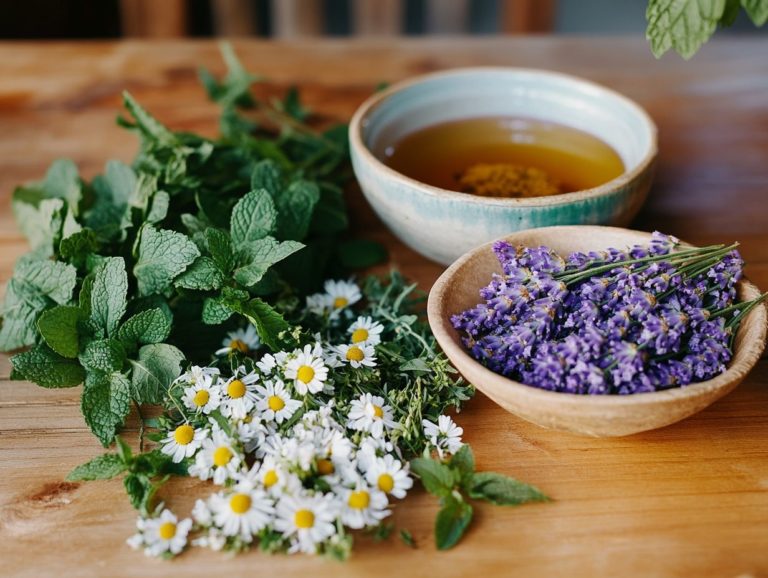Herbal Solutions for Managing Hypertension
Hypertension, or high blood pressure, impacts millions around the globe, posing significant health risks that shouldn’t be overlooked. While traditional medications are often the go-to solution, you may find yourself drawn to herbal remedies for a more natural approach to support your well-being. In this article, we will explore the causes and risk factors of hypertension, showcasing popular herbs and their respective benefits. You ll also discover the scientific evidence that backs these natural solutions.
Contents
- Key Takeaways:
- Understanding Hypertension
- Traditional Herbal Remedies for Hypertension
- Scientific Evidence for Herbal Solutions
- How to Create Your Herbal Treatment Plan for Hypertension
- Creating an Effective Herbal Treatment Plan
- Precautions and Potential Side Effects
- Frequently Asked Questions
- What are herbal solutions for managing hypertension?
- How do these herbal solutions help with hypertension?
- Are there any potential side effects from using herbal solutions for hypertension?
- Can herbal solutions be used as a substitute for prescribed medication?
- Are there any lifestyle changes that should be made in addition to using herbal solutions?
- How long does it take for herbal solutions to show results in managing hypertension?
Key Takeaways:
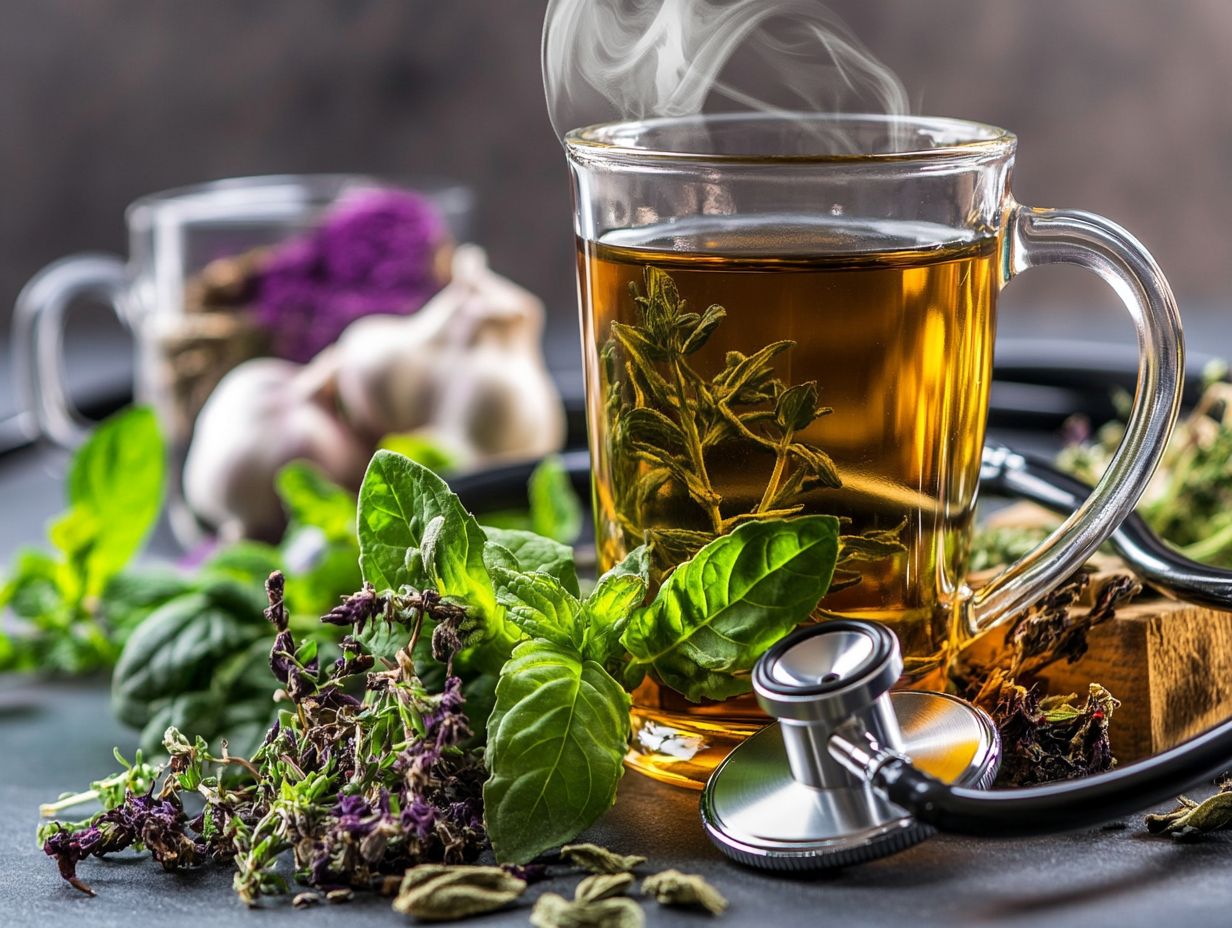
- Traditional herbal remedies can be effective in managing hypertension and reducing blood pressure.
- Combining herbal remedies with traditional treatment may provide even better results.
- It is important to consult with a healthcare professional and monitor herb dosages and frequency for safe and effective management of hypertension.
Understanding Hypertension
Hypertension, often known as high blood pressure, is a long-term issue that affects millions worldwide. It s defined by elevated systolic (top number) and diastolic (bottom number) blood pressure levels, significantly heightening the risk of serious cardiovascular issues, including heart disease and kidney disease.
Various factors, including lifestyle choices, dietary habits, and genetics, play a pivotal role in its development. Gaining a thorough understanding of hypertension is essential for effectively managing and preventing this condition.
Causes and Risk Factors
Several causes and risk factors contribute to the development of hypertension, including genetics, poor diet, and lack of physical activity.
Your dietary choices are crucial; for instance, excessive sodium intake can lead to elevated blood pressure, while insufficient potassium can exacerbate the situation. Obesity is another significant risk factor, as carrying excess weight places additional strain on your heart. Emotional stress also plays a critical role; chronic stress can cause fluctuations in your blood pressure that are hard to manage.
If you have a family history of hypertension, be aware that this can predispose you to similar conditions, amplifying the risks associated with other lifestyle factors. Collectively, these elements heighten your chances of developing hypertension and increase the risk of heart and renal diseases.
Traditional Herbal Remedies for Hypertension
Traditional herbal remedies have become increasingly popular as natural supplements for treating hypertension. They provide potential benefits that can help reduce blood pressure and improve overall cardiovascular health.
You may want to explore herbs such as:
- Garlic: Contains allicin, which helps relax blood vessels.
- Hibiscus sabdariffa: Rich in compounds that improve artery health.
- Olive leaf extract: May help regulate blood pressure.
Popular Herbs and Their Benefits
Several well-regarded herbs, such as garlic, hibiscus sabdariffa, and olive leaf extract, present documented benefits for managing hypertension and enhancing overall heart health.
These natural remedies serve as promising alternatives or complementary options to conventional treatments, utilizing their active compounds to promote cardiovascular wellness. For example, garlic contains allicin, known for its vasodilatory properties, helping to relax blood vessels and lower blood pressure effectively. Additionally, understanding the impact of herbal remedies on heart health can highlight how spices like cinnamon may also contribute positively to blood flow.
Hibiscus sabdariffa is abundant in anthocyanins and phenolic acids, which have been shown to improve arterial health and mitigate hypertension. Meanwhile, olive leaf extract is rich in oleuropein, a compound that may inhibit angiotensin-converting enzyme, a crucial player in blood pressure regulation. Additionally, using herbs to manage diabetes symptoms can also contribute to overall health improvements.
By incorporating these herbs into your daily routine whether through teas, supplements, or natural dishes you can significantly enhance both your heart health and overall wellbeing.
Start your journey towards better health now and explore the power of herbal remedies!
Scientific Evidence for Herbal Solutions
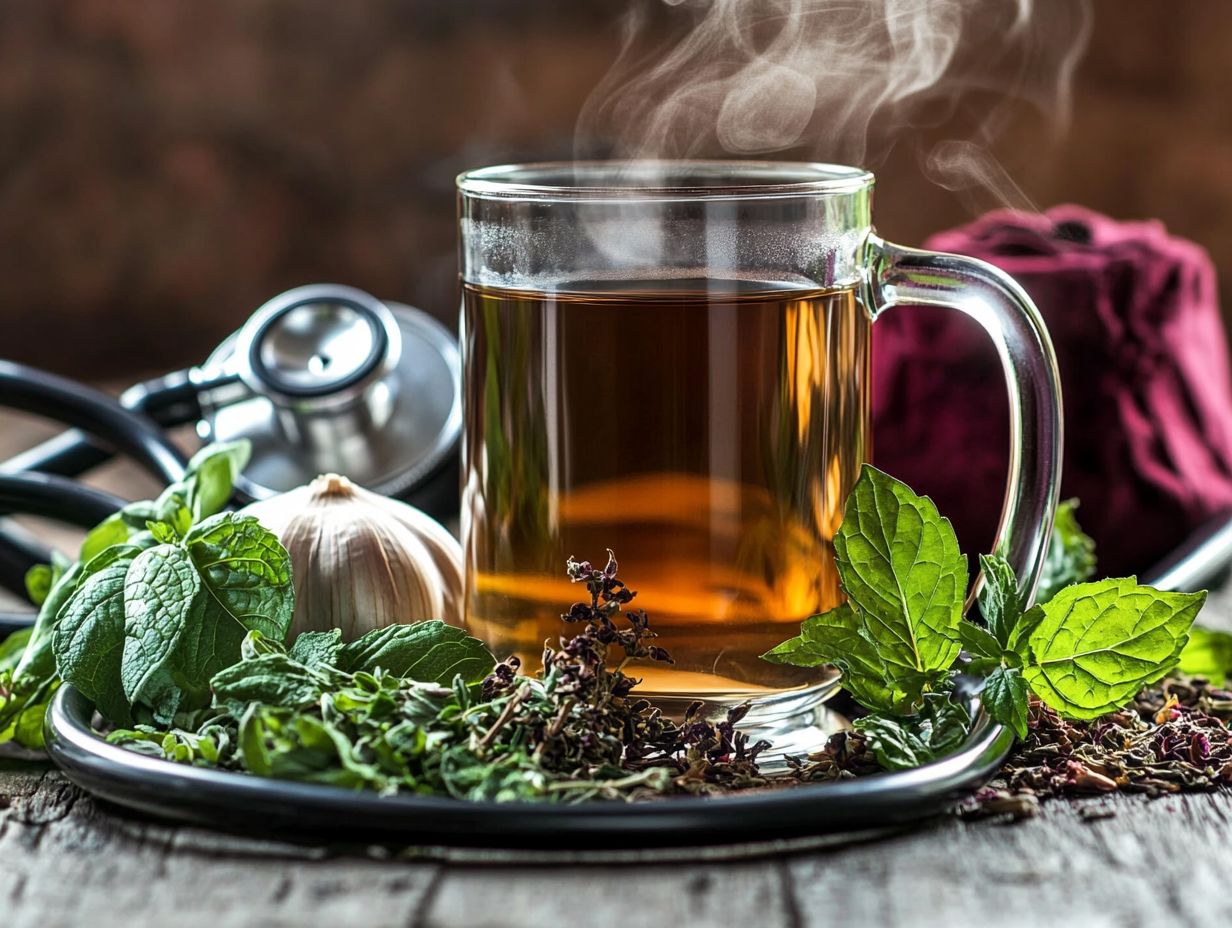
The scientific evidence backing the use of herbal solutions for hypertension is becoming increasingly compelling. Numerous studies have validated the effectiveness of various natural supplements, such as garlic and hibiscus sabdariffa, in managing blood pressure.
You can feel confident knowing that these natural options have gained credibility in the realm of hypertension management.
Studies and Findings
Numerous studies have delved into the effects of herbal remedies like garlic and hibiscus sabdariffa on reducing blood pressure. The results are quite promising.
Research suggests that garlic, particularly in doses between 600 to 1,200 mg per day, can lead to significant reductions in both systolic (the top number in a blood pressure reading) and diastolic (the bottom number) blood pressure for those dealing with hypertension. Hibiscus sabdariffa has proven effective in clinical trials, especially when participants consumed 1 to 2 cups of hibiscus tea daily, experiencing blood pressure reductions comparable to those achieved with conventional medications. For more insights, consider using herbal solutions for cardiovascular health.
These findings highlight the potential of herbal solutions as helpful alternatives for hypertension treatment. They invite you to explore standardized dosages and long-term outcomes. The growing body of evidence supports a wider acceptance of these remedies, including herbal solutions for IBS management, as viable methods for managing cardiovascular health.
How to Create Your Herbal Treatment Plan for Hypertension
By integrating herbal remedies with traditional treatment methods, you can adopt a comprehensive approach to managing hypertension effectively. This strategy not only enhances the safety of your blood pressure control efforts but also ensures greater efficacy in achieving your health goals.
Effectiveness and Safety
The effectiveness and safety of herbal remedies in treating hypertension have become pivotal topics among healthcare professionals and patients. As you seek alternative approaches to manage your blood pressure, explore how these herbal solutions might work with traditional medications.
Many individuals assume that natural products carry fewer risks, but the reality is far more nuanced. You must understand potential interactions and contraindications to ensure you don’t unwittingly compromise your health. For example, certain herbs could enhance the effects of prescription drugs, potentially leading to dangerously low blood pressure levels.
Partner with your healthcare provider to share insights on the best practices for safely integrating herbal treatments for anxiety relief into your treatment plan. This collaboration can help optimize heart health while minimizing risks.
Creating an Effective Herbal Treatment Plan
Crafting an effective herbal treatment plan for hypertension requires your careful attention to dosage, frequency, and continuous monitoring. It’s crucial to determine these factors for achieving optimal results in managing blood pressure effectively.
Dosage and Frequency
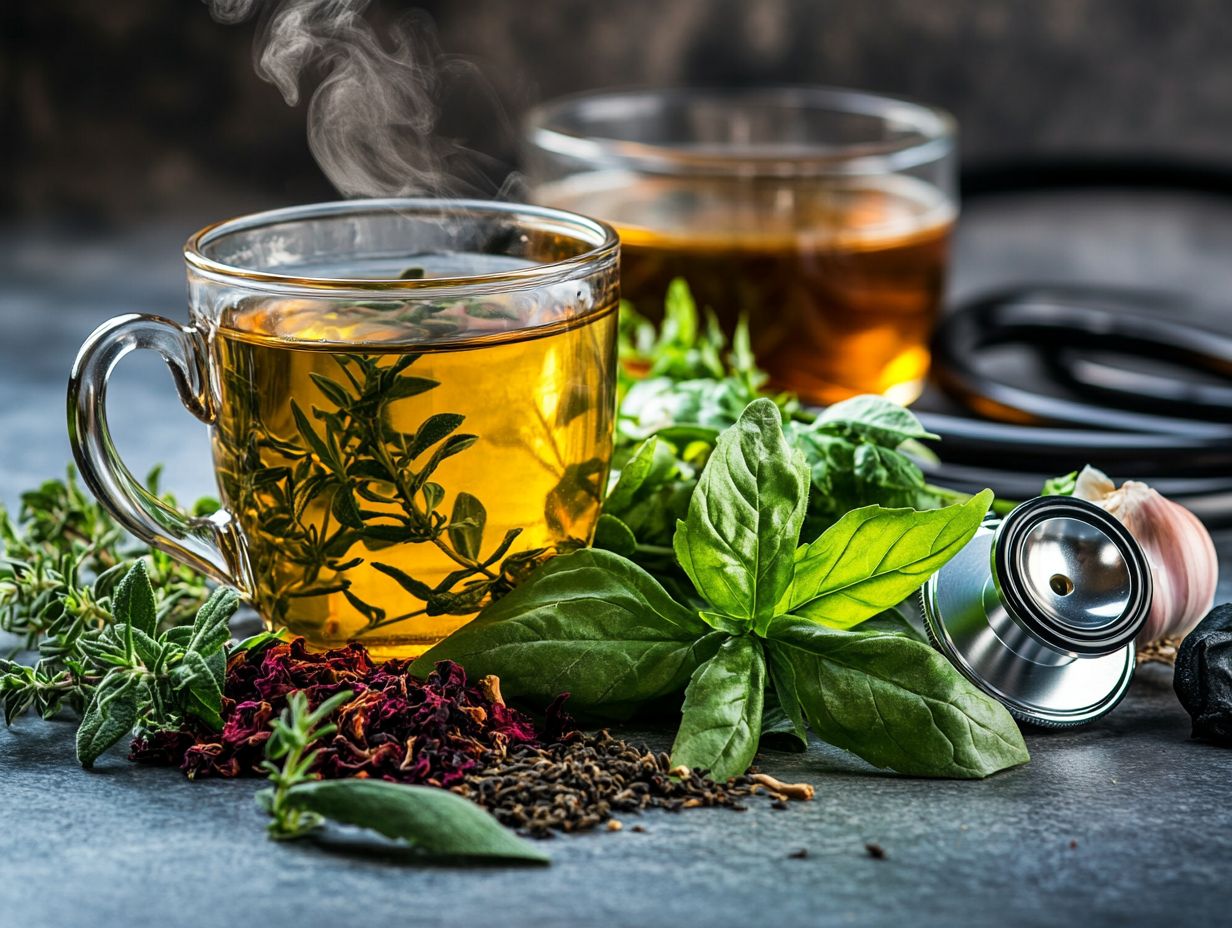
Determining the right dosage and frequency for herbal remedies in treating hypertension is essential for achieving optimal results.
Customize your treatment plan based on your health status, lifestyle, and any underlying conditions you may have. For example, while some individuals may thrive on daily doses of hawthorn extract, others might find that top herbal solutions for reducing cholesterol, like occasional garlic supplements, work better for them.
It’s vital to consider factors such as your age, weight, and any medications you’re currently taking, as these will influence how your body reacts to herbal interventions. Therefore, consulting with a healthcare provider who appreciates the unique characteristics of these remedies, including natural herbal solutions for migraines, is key. This can help ensure that you use them safely and effectively while minimizing the risk of adverse effects or interactions.
Monitoring and Adjusting
Regularly monitoring and adjusting your herbal treatment plan is crucial for effectively managing hypertension and achieving optimal blood pressure levels.
Stay proactive! This process helps you quickly tackle any changes in your blood pressure, allowing for timely modifications to your treatment regimen.
Your healthcare provider plays an important role in this journey by interpreting your results and suggesting necessary adjustments based on your unique response to herbal remedies for heart health.
They offer valuable guidance on lifestyle changes, such as diet and exercise, that perfectly complement your herbal approach. Additionally, exploring the top herbs for managing stress effectively can enhance your overall well-being. They emphasize that diligent tracking leads to a more personalized and effective management of your blood pressure, ultimately reducing the risk of related health complications.
Precautions and Potential Side Effects
Understanding the precautions and potential side effects of herbal remedies for hypertension is essential to ensure that you engage in safe and effective treatment. By being well-informed, you can navigate your options with confidence and make choices that best support your health and well-being.
Consulting with a Healthcare Professional
Don’t skip this step! Consult your healthcare professional before starting any herbal remedies for hypertension, ensuring both safety and efficacy.
This step is particularly important when considering the potential interactions that herbal supplements may have with your prescribed blood pressure medications.
You might be surprised to learn that certain herbs, which seem harmless at first glance, can actually disrupt the effectiveness of your medication or even trigger unwanted side effects.
Engaging in a thoughtful dialogue with your healthcare provider not only helps you assess the suitability of herbal treatments but also deepens your understanding of dosage, potential side effects, and any necessary monitoring.
By prioritizing this crucial conversation, you can adopt a more holistic approach to managing hypertension, ensuring that both traditional and herbal methods work in concert for your well-being.
Frequently Asked Questions
What are herbal solutions for managing hypertension?
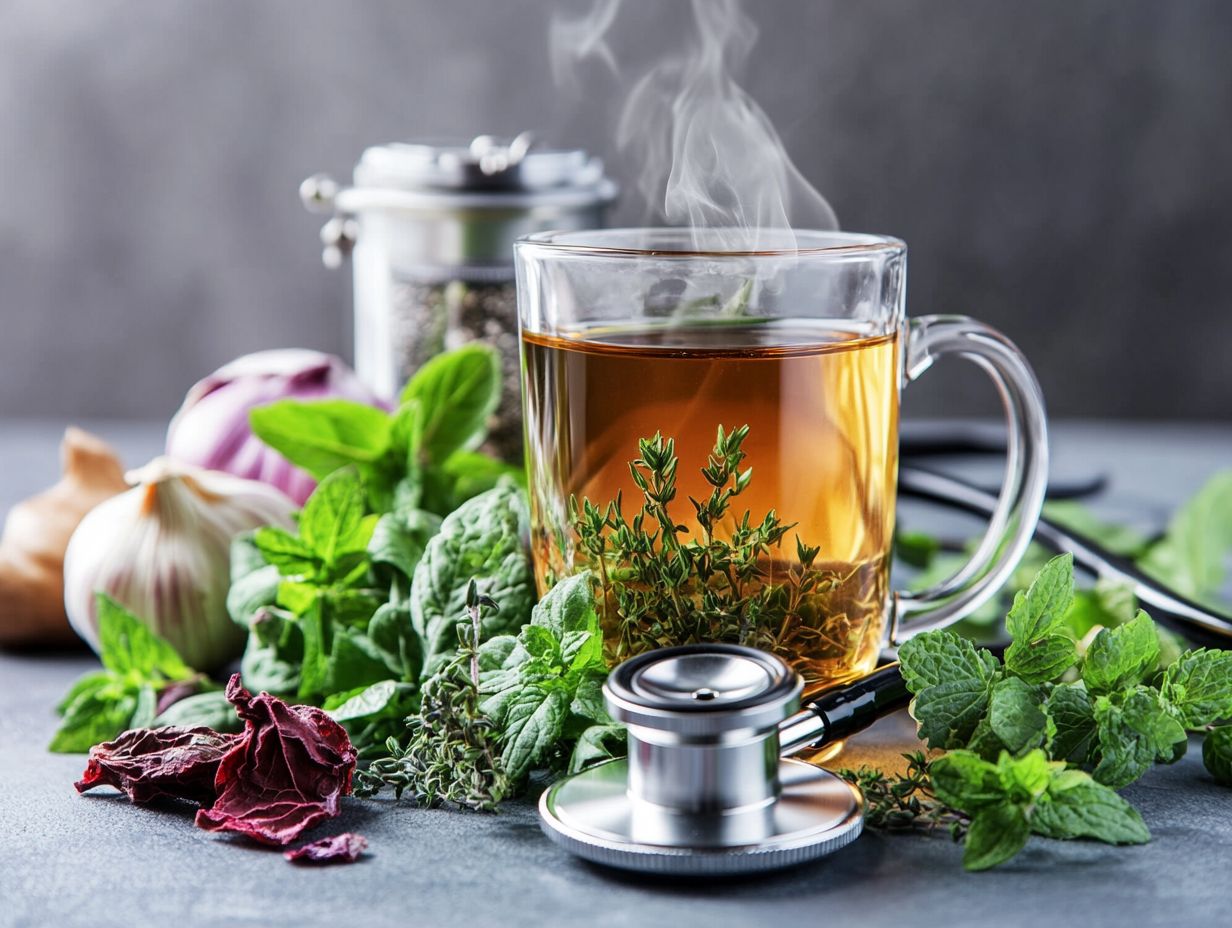
Herbal solutions for managing hypertension include using natural remedies such as garlic, hawthorn, and omega-3 fatty acids.
How do these herbal solutions help with hypertension?
Garlic is believed to lower blood pressure and improve circulation. Hawthorn is thought to relax blood vessels and improve heart function, while omega-3 fatty acids can reduce inflammation and improve blood flow.
Are there any potential side effects from using herbal solutions for hypertension?
While herbal solutions are generally considered safe, some may cause side effects such as digestive issues, headaches, or interactions with medications. It is important to consult with a healthcare professional before starting any herbal remedies.
Can herbal solutions be used as a substitute for prescribed medication?
No, herbal solutions should not be used as a substitute for prescribed medication. They can be used as a complementary treatment, but it is important to follow your doctor’s recommendations and continue taking prescribed medication as directed.
Are there any lifestyle changes that should be made in addition to using herbal solutions?
Yes, lifestyle changes such as maintaining a healthy diet, exercising regularly, managing stress, and quitting smoking can also help manage hypertension.
How long does it take for herbal solutions to show results in managing hypertension?
Results may vary for each individual, but it is recommended to use herbal solutions consistently for at least 3 months to see full benefits. It is important to also monitor blood pressure levels regularly to track effectiveness.
Have questions or experiences to share about herbal solutions for hypertension? Feel free to ask!
Start your journey to better health today by consulting with your healthcare provider!

